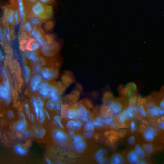Annual workshop: state of the art in cancer research


The annual workshop "Current Trends in Cancer Modelling and Research" in November 2021 enabled Polytechnique students to come into contact with high-level cancer research. For Alexis Gautreau, CNRS research director at the Structural Biology of the Cell Laboratory (BIOC*) organiser of the event as part of the Servier-supported Personalised Tumour Reconstruction programme, "this workshop creates an opportunity to expose students to cutting-edge research and inspire careers". The different speakers, from multiple academic and hospital institutions, detailed their topics in an accessible way.
For the first presentation, Julie Plastino (Physics Laboratory of the École Normale Supérieure - PSL) presented her work on the migration and invasion of cancer cells by comparing them with specific cells of a transparent (and therefore easily observable) worm called C. elegans. These two types of cells have the capacity to cross the organism with very similar mechanisms involving actin, one of the 'skeletons' of the cells.
Christophe Lamaze (Institut Curie) discussed the key role of particular areas of the cell membrane, called caveolae, in the ability of cells to absorb mechanical pressure. In the breast, cells are very mechanically constrained (cell density and gravity). In the case of breast cancer, the caveolae may become non-functional, no longer able to absorb the mechanical stress and causing the cancer cells to disperse throughout the body.
The migration of groups of cancer cells in the body is a phenomenon that is still poorly understood today, as Fanny Jaulin (Gustave Roussy Hospital) explained to us. Her work, which involved specialists in microfluidics, tends to show that these groups move by following a contraction mode similar to that of amoebas.
Jacky Goetz (Centre de Recherche en Biomédecine de Strasbourg) presented his work which indicates that cancer cells prepare the sites for metastasis by producing various compounds in the blood. He illustrated his remarks with a number of high quality films from live imaging of the zebrafish bloodstream.
Julie Gavard, (Nantes Cancer Centre), detailed her studies on the role of a hormone, called Apeline, on the formation of tumour spheres, a characteristic structure of tumours that allows for increased resistance to treatment. Acting on Apelin, without disturbing its essential physiological functions in the body, would be a potential therapeutic approach for highly targeted treatment.
Christophe Ginestier (Marseille Cancer Research Centre and Institut Paoli-Calmettes) presented an anti-cancer treatment currently undergoing preclinical trials in mice. This treatment targets cancer stem cells at the heart of tumours in order to specifically eliminate them, thereby abolishing the ability of cancer cells to multiply indefinitely.
The last presentation was given by Isabelle Janoueix-Lerosey (Institut Curie), who presented a fundamental study on two cell types among those constituting neuroblastomata, a rare type of childhood cancer. Her work shows that one type can switch to the other thanks to epigenetic factors, making it possible to compare the effects of chemotherapy according to the identity of the cells for a more personalised treatment.
These different presentations, organised as part of this sponsorship programme, provided a landscape of research contributing to the understanding of cancers. Students were able to discover research interfacing with mechanics, alternative animal models to mammals (worms, fish) and the most advanced imaging technologies.
*BIOC : a joint research unit CNRS, École Polytechnique - Institut Polytechnique de Paris
>> about the sponsorship programme:
Created in 2019, the teaching and research sponsorship "Personalised reconstruction of the tumour process" seeks to understand the process that leads to the formation of a tumour in a given breast cancer patient. For this purpose, the various genetic alterations of the patient's tumour are sequentially introduced into the genome of the healthy cell in order to obtain an avatar of the tumour. These artificially recreated tumours allow a better understanding of how tumours develop and provide a system in which to test different chemotherapies in order to identify the most appropriate for the patient. The Servier Group's sponsorship of this project, led by Alexis Gautreau, will enable students at the École Polytechnique to be introduced to personalised cancer medicine and genome editing techniques, thanks to a complete immersion in the laboratory.
 Support l'X
Support l'X